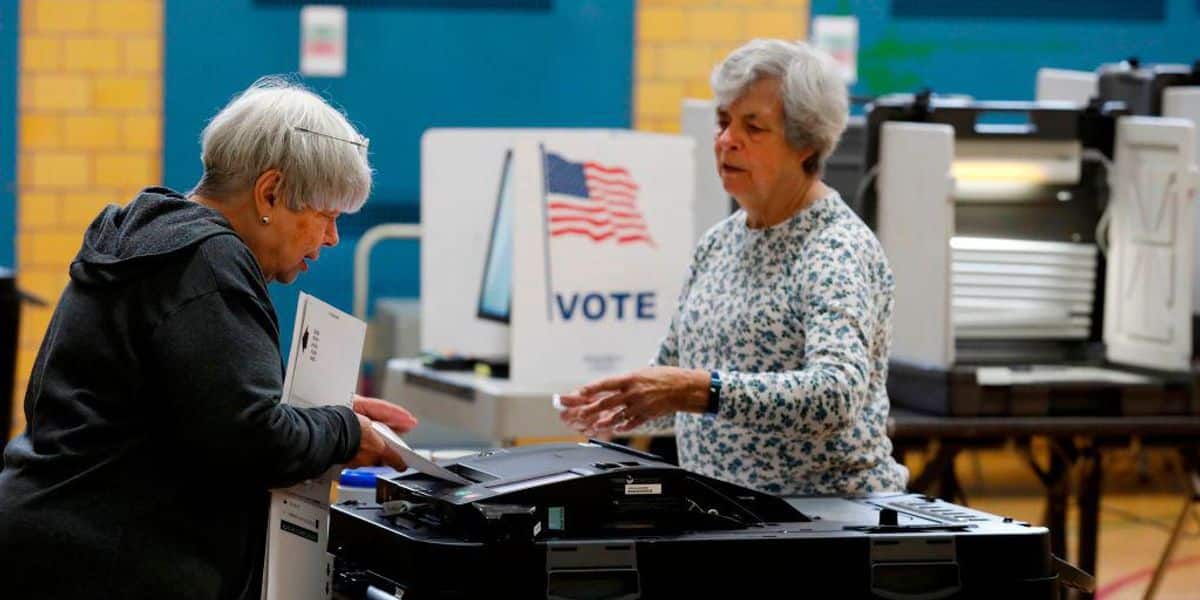The forensic audit of Dominion Voting Systems machines in Antrim County, Michigan, turned out a 68% error rate, indicating that the machines may have been “intentionally designed” to allow for fraud, according to the Trump-linked cyber analysts who inspected it.
The report, which if true raises further suspicions regarding the 2020 election, was immediately disputed by state officials and Dominion representatives.
What are the details?
The forensic audit was ordered last week by Judge Kevin Elsenheimer of the 13th Circuit Court after a county resident, William Bailey, requested it in a lawsuit challenging the integrity of the 2020 election results. Bailey’s lawsuit contested the outcome of a local proposal to allow a marijuana dispensary in town. However, the audit’s results were also pertinent to the presidential election, especially considering it was in Antrim County where 6,000 votes had been incorrectly switched from President Donald Trump to Democratic challenger Joe Biden in early vote tabulation, before being corrected.
The audit was conducted by Allied Security Operations Group, a cyber firm co-founded by Russell Ramsland Jr. who has been cited as expert testimony in several of the battleground state lawsuits filed by Trump’s legal team. The audit was reportedly conducted in the presence of several county officials.
What does the report say?
In the newly released report, Ramsland concluded that “the Dominion Voting System is intentionally and purposefully designed with inherent errors to create systemic fraud and influence election results.”
“The allowable election error rate established by the Federal Election Commission guidelines is of 1 in 250,000 ballots (.0008%). We observed an error rate of 68.05%. This demonstrated a significant and fatal error in security and election integrity,” he stated in the report. “The results of the Antrim County 2020 election are not certifiable. This is a result of machine and/or software error, not human error.”
Antrim County officials originally blamed the vote-flipping on a system glitch before later assessing that a Republican election official failed to update the system before the vote tabulation.
“It is critical to understand that the Dominion system classifies ballots into two categories, 1) normal ballots and 2) adjudicated ballots,” he continued. “Ballots sent to adjudication can be altered by administrators, and adjudication files can be moved between different Results Tally and Reporting (RTR) terminals with no audit trail of which administrator actually adjudicates (i.e. votes) the ballot batch. This demonstrated a significant and fatal error in security and election integrity because it provides no meaningful observation of the adjudication process or audit trail of which administrator actually adjudicated the ballots.
“A staggering number of votes required adjudication. This was a 2020 issue not seen in previous election cycles still stored on the server. This is caused by intentional errors in the system. The intentional errors lead to bulk adjudication of ballots with no oversight, no transparency or audit trail,” the report stated. “Our examination of the server logs indicates that this high error rate was incongruent with patterns from previous years. The statement attributing these issues to human error is not consistent with the forensic evaluation, which points more correctly to systemic machine and/or software errors. The systemic errors are intentionally designed to create errors in order to push a high volume of ballots to bulk adjudication.”
Videos posted to YouTube by election officials in Coffee County, Georgia, recently purported to show how ballots can be switched or filled out in the Dominion system after they are sent to adjudication.
Matthew DePerno, the attorney representing Bailey, went into further detail about how he believes the machines were designed to create fraud during an interview with reporter John Solomon.
“We found that the Dominion Voting Systems is designed intentionally to create inherent and systemic voting errors. What I mean by that is when you run a ballot through the machine, even if it’s a blank ballot, it will have a 68% chance of creating an error,” DePerno told Solomon. “When you create an error, this machine does not reject the ballot. What it does instead is send it to a folder and that folder will then accumulate the ballots until the time that someone decides that they need those ballots. And then those ballots will be bulk adjudicated by someone. Could be offsite, could be onsite somewhere sitting at a computer. And, without any oversight, they can click one button, lope the entire batch of ballots to one candidate and then send them back to the tabulator.”
What has been the response?
In a news release, Michigan officials decried the report as “another in a long stream of misguided, vague and dubious assertions designed to erode public confidence in the November presidential election.”
“Let’s be clear: Michigan’s Nov. 3 general election was the most secure in our state’s history,” Secretary of State Jocelyn Benson said in response to the report. “There continues to be no evidence of widespread fraud, as affirmed by state and federal agencies including Attorney General William Barr, the Federal Bureau of Investigation, and the Cybersecurity and Infrastructure Security Agency.”
“If the Trump campaign had any actual evidence of wrongdoing — or genuine suspicion thereof — they could have requested a hand recount of every ballot in the state. They did not, instead choosing to allow shadowy organizations claiming expertise to throw around baseless claims of fraud in an effort to mislead American voters and undermine the integrity of the election. Their actions are a corruption of the courts and the rule of law, as the release of today’s report clearly demonstrates,” she continued, later calling into question Allied Security Operations Group’s credentials.
Dominion representatives have also maintained that the allegations in the report are incorrect.
A spokesperson for the company, Michael Steel, told Fox News in November that switching votes from one candidate to another on the machines was “physically impossible.” He added that “if any electronic interference had taken place, the tally reported electronically would not match the printed ballots.”
In a Wall Street Journal op-ed, Dominion CEO John Poulos wrote: “There is no secret ‘vote flipping’ algorithm. Third-party test labs, chosen by the bipartisan Election Assistance Commission and accredited by a program of the National Institute of Standards and Technology, perform complete source-code reviews on every federally certified tabulation system. States replicate this process for their own certifications. Post-election canvassing and auditing also exist to provide additional assurance of the vote totals’ accuracy.”









